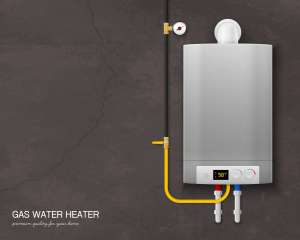Water Heaters: A Comprehensive Guide to Efficient and Eco-Friendly Solutions

Water heaters play a crucial role in our homes, working silently to offer the convenience of hot water for diverse needs. Whether it’s indulging in a comforting hot shower or ensuring spotless dishes, a dependable water heating system is a fundamental necessity. In this article, we will delve into the world of water heaters, exploring different types, energy efficiency, installation, maintenance, and more.
Types of Water Heaters
Tankless Water Heaters
Tankless water heaters, alternatively referred to as on-demand water heaters, supply hot water precisely when required. They are energy-efficient and space-saving, making them an excellent choice for modern homes.
Storage Tank Water Heaters
Traditional storage tank water heaters store and preheat a significant amount of water, ensuring a constant supply. Although they may be less energy-efficient than tankless models, they are reliable and suitable for larger households.
Heat Pump Water Heaters
These innovative heaters move heat from the air or ground to heat the water. Although their initial expense might be higher, these systems are exceptionally energy-efficient and environmentally conscious.
Solar-Powered Water Heaters
Harnessing the power of the sun, solar-powered water heaters are a sustainable option. They are especially beneficial in sunny regions, reducing reliance on electricity or gas.
Choosing the Right Size
Choosing the appropriately sized water heater is essential for achieving optimal performance. Factors such as the number of occupants, peak usage times, and the climate of your location play a role in determining the appropriate size. Installing an undersized water heater can result in insufficient hot water, while an oversized one may lead to unnecessary energy consumption.
Energy Efficiency
Investing in an energy-efficient water heater not only reduces utility bills but also benefits the environment. Look for Energy Star-rated models, which meet strict energy efficiency guidelines set by the U.S. Environmental Protection Agency. Water heaters designed for energy efficiency frequently incorporate advanced technologies to reduce heat loss and optimize energy consumption.
Installation Process
The installation of a water heater is a crucial step that influences its performance and longevity. While some homeowners opt for a DIY approach, professional installation is recommended for safety and compliance reasons. Certified technicians ensure proper sizing, connection, and venting, addressing potential challenges during the installation process.
Maintenance Tips
Regular maintenance is key to the longevity and efficiency of your water heater. Flushing the tank to remove sediment, checking for leaks and corrosion, and adjusting the thermostat are essential tasks. These simple steps can prevent issues and extend the lifespan of your water heater.
Common Issues and Troubleshooting
Grasping common problems with water heaters gives homeowners the. Lack of hot water may indicate a faulty heating element, while strange noises can signal sediment buildup. Water heater leaks require immediate attention to prevent water damage and potential safety hazards.
Upgrading Your Water Heater
Knowing when to upgrade your water heater is crucial for optimal performance and energy savings. Indications like decreased efficiency, frequent repairs, or an outdated unit imply that it’s time to consider an upgrade. Explore the latest technologies, such as hybrid water heaters that combine efficiency and versatility.
Environmental Impact
For environmentally conscious consumers, there are eco-friendly water heating options available. Solar-powered and heat pump water heaters play a significant role in diminishing carbon footprints, promoting a more sustainable lifestyle. Consider the environmental impact when making your water heater decision.
Cost Considerations
While the initial cost of a water heater is a significant factor, it’s essential to consider long-term savings. Although energy-efficient models may come with a higher initial cost, they can result in significant savings over the years. Additionally, explore government incentives and rebates for choosing eco-friendly options.
Comparing Brands and Models
Choosing a reputable brand ensures the reliability and performance of your water heater. Research top-rated brands and read customer reviews to gauge user satisfaction. Consider factors such as warranty, customer support, and the availability of replacement parts when comparing different models.
Safety Measures
Ensuring correct installation and routine maintenance enhance the safety of your water heating system. Adequate ventilation is crucial to prevent the buildup of potentially harmful gases. Follow safety guidelines, and if in doubt, consult with a professional technician.
Innovations in Water Heating
Stay ahead of the curve with smart water heaters that offer remote control and automation features. These advancements not only improve convenience but also contribute to enhanced energy efficiency. Integrate your water heating system with home automation for a seamless and intelligent home.
Future Trends in Water Heating
As technology continues to advance, the future of water heating looks promising. Keep an eye on emerging trends such as advanced sensors, improved insulation, and enhanced connectivity. Sustainable practices in water heating, including more efficient use of renewable energy sources, are expected to shape the industry.
Conclusion
Choosing the right water heater involves careful consideration of various factors. From the type of water heater to energy efficiency and environmental impact, each aspect plays a crucial role. By making informed decisions, homeowners can enjoy reliable hot water while minimizing their ecological footprint.
Now equipped with insights into the diverse realm of water heaters, you can make a confident choice that aligns with your requirements, budget, and principles.
FAQs – Frequently Asked Questions
1. Q: How often should I flush my water heater?**
A: It’s recommended to flush your water heater at least once a year to remove sediment and maintain optimal performance.
